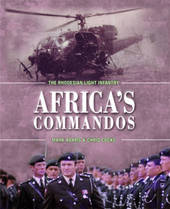
|
Africa'S Commandos: The Rhodesian Light Infantry from Border Control to Airborne Strike Force
Hardback
Main Details
| Title |
Africa'S Commandos: The Rhodesian Light Infantry from Border Control to Airborne Strike Force
|
| Authors and Contributors |
Edited by Chris Cocks
|
|
Edited by Mark Adams
|
| Physical Properties |
| Format:Hardback | | Pages:344 | | Dimensions(mm): Height 297,Width 210 |
|
| Category/Genre | African history |
|---|
| ISBN/Barcode |
9781907677755
|
| Classifications | Dewey:968.9104 |
|---|
| Audience | |
|---|
| Illustrations |
Approx 600 photos, maps etc
|
|
Publishing Details |
| Publisher |
Helion & Company
|
| Imprint |
Helion & Company
|
| Publication Date |
15 June 2012 |
| Publication Country |
United Kingdom
|
Description
Few, if any, regiments have left their mark on the history of modern warfare as did the Rhodesian Light Infantry. Raised on 1 February 1961 the RLI first evolved into a commando unit then became involved in mundane border-control duties in the Zambezi Valley. Later as the bush war intensified the RLI was to evolve into a ruthlessly efficient 'killing machine'. This book chronicles the military evolution of the RLI from the peacetime soldiering days through to the constant high-intensity combat of the final years. Initially comprising volunteers from South Africa and Britain the RLI was always under strength until 1976 when the percentage of national servicemen serving in the RLI was dramatically increased to meet ever-increasing operational demands. The historical record will show how these young men, led and commanded by an outstanding combination of tough and battle-hardened non-commissioned officers and a skilled and aggressive officer corps, inflicted massive damage on the ZANLA and ZIPRA insurgent forces. The ruthless efficiency of the joint Air Force and RLI Fireforce operations where the RLI was deployed by helicopter and later also by parachute was to account for the deaths of in excess of 12,000 insurgents during the course of the war at a rate of 160 enemy killed for every one of their own lost: a truly remarkable record. Throughout the war the RLI never ceased to learn, adapt and evolve militarily and as such provides many important lessons for students of modern warfare in how a small military structure making the maximum and creative use of the limited resources available can achieve so much with so little. Disbanded after the political settlement on 31 October 1980 the RLI marched into history. Gone but never to be forgotten, this is the story of"the incredible RLI".
Author Biography
Chris Cocks was born in Salisbury, Rhodesia in 1957 and served three years and 28 days as a combat NCO with 3 Commando, the Rhodesian Light Infantry (the RLI, an airborne/airmobile unit), from 1976 to 1979. He was then offered a farming job in the country's Lowveld; however, the army refused to countenance a waiver of call-ups, so he attested into the British South Africa Police and spent the remaining 14 months of the bush war as a PATU (Police Anti-Terrorist Unit) stick leader and avoiding the Military Police. He moved to Johannesburg in 1996 and stumbled into a publishing career, specializing in southern African military history. He has written four books: the bestselling Fireforce: One Man's War in the Rhodesian Light Infantry, its sequel Out of Action, a steamy novel Cyclone Blues, and co-wrote The Saints, the RLI's history. He is the historian for The Rhodesian Light Infantry Regimental Association and edits its magazine, The Cheetah. Mark Adams was born in Cape Town in 1953. Educated at Rondebosch Boys' High, he played Craven Week rugby for Western Province and qualified as a PT instructor in 1972. Through an agreement between the Rhodesian and South African governments Mark, along with a number of others, was recruited into the Rhodesian Light Infantry (RLI). He joined 2 Commando, 1RLI, before being commissioned as a subaltern into 3 Commando as OC 12 Troop in 1974. In 1978 he was awarded the Bronze Cross of Rhodesia (BCR) for valour and later that year was posted to the School of Infantry to train officer cadets. As GSO3 (Ops) HQ 3 Brigade he saw out the Zimbabwean transition before returning to South Africa in 1980. He served three years with the South African paras, involved in training at 1 Parachute Battalion and 44 Parachute Brigade before finally leaving the military. He worked for NGOs in Malawi and Mozambique for three years, involved in the repatriation of refugees, before returning to South Africa and a career in security. He lives in Durban and runs his own security management and consulting services business.
|